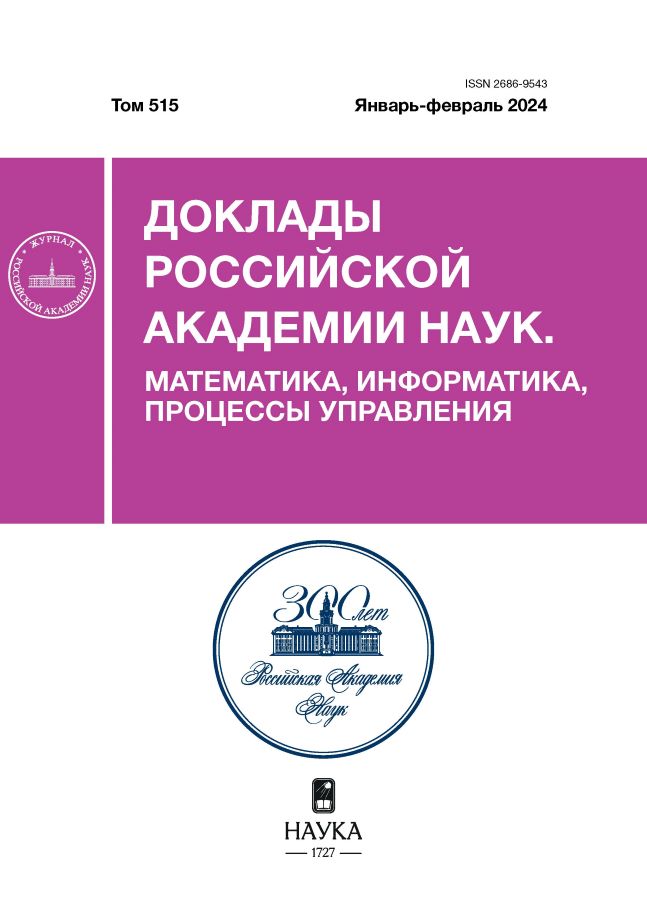A note on Borsuk’s problem in Minkowski spaces
- 作者: Raigorodskii A.M.1,2,3,4, Sagdeev A.5,1
-
隶属关系:
- Moscow Institute of Physics and Technology
- Moscow State University
- Caucasus Mathematical Center, Adyghe State University
- Buryat State University
- Alfred Renyi Institute of Mathematics
- 期: 卷 515 (2024)
- 页面: 100-104
- 栏目: MATHEMATICS
- URL: https://rjeid.com/2686-9543/article/view/647958
- DOI: https://doi.org/10.31857/S2686954324010151
- EDN: https://elibrary.ru/ZSZNVW
- ID: 647958
如何引用文章
详细
In 1993, Kahn and Kalai famously constructed a sequence of finite sets in d-dimensional Euclidean spaces that cannot be partitioned into less than parts of smaller diameter. Their method works not only for the Euclidean, but for all lp-spaces as well. In this short note, we observe that the larger the value of p, the stronger this construction becomes.
全文:
作者简介
A. Raigorodskii
Moscow Institute of Physics and Technology; Moscow State University; Caucasus Mathematical Center, Adyghe State University; Buryat State University
编辑信件的主要联系方式.
Email: mraigor@yandex.ru
俄罗斯联邦, Moscow; Moscow; Maykop; Ulan-Ude
A. Sagdeev
Alfred Renyi Institute of Mathematics; Moscow Institute of Physics and Technology
Email: sagdeevarsenii@gmail.com
匈牙利, Budapest; Moscow, Russia
参考
- Baker R.C., Harman G., Pintz J. The difference between consecutive primes. II // Proc. Lond. Math. Soc. (3). 2001. Vol. 83. No. 3. P. 532–562.
- Bogolubsky L.I., Raigorodskii A.M. On bounds in Borsuk’s problem // Proc. MIPT (Trudy MFTI). 2019. Vol. 11. No. 3. P. 20–49.
- Boltyanskii V.G., Gohberg I.T. Results and Problems in Combinatorial Geometry. Cambridge: Cambridge Univ. Press, 1985; M.: Nauka, 1965.
- Bondarenko A. On Borsuk’s Conjecture for Two-Distance Sets // Discrete Comput. Geom. 2014. Vol. 51. No. 3. P. 509–515.
- Borsuk K. Drei Sätze über die -dimensionale euklidische Sphäre // Fundamenta Math. 1933. Vol. 20. P. 177–190.
- Bourgain J., Lindenstrauss J. On covering a set in by balls of the same diameter, Geometric Aspects of Functional Analysis (J. Lindenstrauss and V. Milman, eds.) // Lecture Notes in Math. 1469. Springer, Berlin, 1991. P. 138–144.
- Frankl P., Wilson R.M. Intersection theorems with geometric consequences // Combinatorica. 1981. Vol. 1. No. 4. P. 357–368.
- Grünbaum B. Borsuk’s partition conjecture in Minkowski planes // Bull. Res. Council Israel Sect. F. 7F. 1957. P. 25–30.
- Jenrich T., Brouwer A.E. A 64-Dimensional Counterexample to Borsuk’s Conjecture // Electron. J. Combin. 2014. Vol. 21. No. 4. P4.29.
- Kahn J., Kalai G. A counterexample to Borsuk’s conjecture // Bull. Amer. Math. Soc. 1993. Vol. 29. No. 1. P. 60–62.
- Lassak M. An estimate concerning Borsuk’s partition problem // Bull. Acad. Polon. Sci. Ser. Math. 1982. Vol. 30. P. 449–451.
- Raigorodskii A.M. Semidefinite programming in combinatorial optimization with applications to coding theory and geometry. 2013. Thesis. Available at https://theses.hal.science/tel-00948055
- Raigorodskii A.M. Around Borsuk’s conjecture // J. Math. Sci. 2008. Vol. 154. No. 4. P. 604–623.
- Raigorodskii A.M. Coloring Distance Graphs and Graphs of Diameters // Thirty Essays on Geometric Graph Theory / ed. J. Pach. Springer, 2013. P. 429–460.
- Raigorodskii A.M. On a bound in Borsuk’s problem // Russian Math. Surveys, 1999. Vol. 54. No. 2. P. 453–454.
- Raigorodskii A.M. On the dimension in Borsuk’s problem // Russian Math. Surveys. 1997. Vol. 52. No. 6. P. 1324–1325.
- Rogers C.A., C. Zong C. Covering convex bodies by translates of convex bodies // Mathematika. 1997. Vol. 44. No. 1. P. 215–218.
- Schramm O. Illuminating sets of constant width // Mathematika. 18. Vol. 35. P. 180–189.
- Swanepoel K.J. Combinatorial distance geometry in normed spaces // New Trends in Intuitive Geometry. 2018. P. 407–458.
- Wang J., Xue F. Borsuk’s partition problem in four-dimensional space. Preprint arXiv:2206.15277.
- Weissbach B. Sets with large Borsuk number // Beiträge Alg. Geom. 2000. Vol. 41. P. 417–423.
- Yu L., Zong C. On the blocking number and the covering number of a convex body // Adv. Geom. 2009. Vol. 9. No. 1. P. 13–29.










